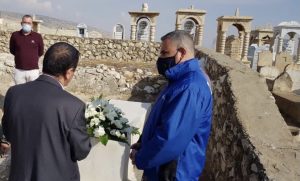By: Alexis Eka
Impunity Watch Staff Writer
IRAQ – Following the letter sent by Human Rights Watch on November 5th, 2020, there remains little action on the part of the Iraqi government in their promised efforts in identifying the enforced disappearances of Iraqi citizens. The letter was sent to the Prime Minister and provided details of eight missing individuals. Since taking office in May 2020, Prime Minister Mustafa Al-Kadhimi announced that his committees would be enforcing a new mechanism to locate victims of enforced disappearances, but the legal authorities have not yet executed this decision.

Enforced disappearances occur when a state forcibly detains citizens and authorities fail to provide information to the families of those that have disappeared about the reasoning behind the detainment, the location of the detainment, and the time span of the detainment. Enforced disappearances are a serious criminal act under international law. There have been increases in the number of detained Sunni Arab families and Sunni Arab men in Iraq. Enforced disappearances are not a new occurrence in Iraq. These disappearances have been common here for over a decade.
Human Rights Watch has documented the enforced disappearances of over seventy-eight men and boys from the ages of nine to seventy years old from April 2014 until October 2017. Members of the victims’ families received threats from these armed authorities and often times the victim’s family members are even physically present during the time of the victim’s detainment. Often times the security forces indicate to victims’ families that the arrests were related to or occurred from their participation in the fight against ISIS. As a result, several victims’ family members have been intimidated and taunted by government officials to the extent that they no longer attempt to locate their family members out of fear of their own execution or abduction. .
Several organizations including the International Commission on Missing Persons (ICMP), have participated in the excavations of numerous mass graves located near Sinjar. ICMP has worked together with Iraqi citizens in creating a “sustainable process to locate all missing persons, regardless of the period of disappearance, the circumstances, or the national origin of the missing persons.” Additionally, the UN Committee on Enforced Disappearances (CED) held a public discussion with Iraq that focused on the country’s governmental response to the reoccurring issue of enforced disappearances.
Several citizens in Iraq have voiced their concerns about the lack of governmental interest in the enforced disappearances. They have indicated that Iraqi security forces have managed to target anyone who willingly speaks out against the security forces and their actions during these protests initiated by the Iraqi citizens. Amnesty International continues to receive reports of activists and journalists that have been threatened by security forces. They have received warnings that if they continue to speak out against human rights violations and the violence used against protesters, that they will be added to the blacklist created and compiled by intelligence services.
For further information, please see: